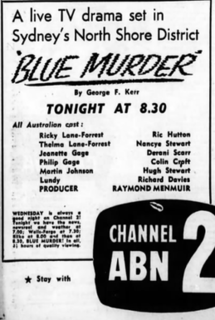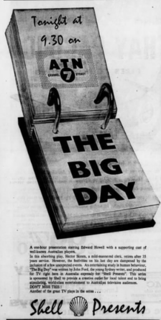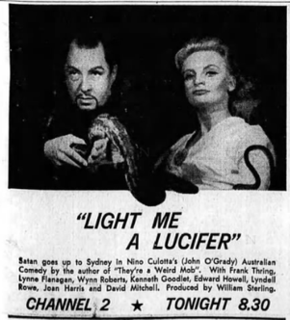Related Research Articles

Shell Presents was an early attempt at Australian television drama, being an umbrella title for several different productions. It debuted on 4 April 1959, and aired on ATN-7 and GTV-9, who split production of plays for the series between them. It was an anthology series, each program being a self-contained play for television. The series won a Logie award in 1960 for TV Highlight of 1959. As the title suggests, it was sponsored by Shell. It was described as "a very big deal for the station: major institutional sponsorship from international companies for locally produced drama." It would be followed by The General Motors Hour.

Dynasty is an Australian TV series that aired from 7 October 1970 to 6 October 1971, based on the 1967 Tony Morphett novel of the same name which had been previously adapted as a television play.

Blue Murder is an Australian live television play which aired in 1959 on ABC. Broadcast live in Sydney on 2 December 1959, a kinescope ("telerecording") was made of the broadcast so it could be shown in Melbourne.

"The Big Day" is an Australian television film, or rather a live television play, which aired in 1959. The fifth episode of the Shell Presents presentations of standalone television dramas, it originally aired 11 July 1959 on Melbourne station GTV-9, a video-tape was made of the broadcast and shown on Sydney station ATN-7 on 25 July 1959.

Close to the Roof is a 1960 Australian live television play which aired on ABC. Broadcast 14 December 1960 in Sydney, it was kinescoped ("telerecorded") and shown in Melbourne on 25 January 1961. Australian TV drama was relatively rare at the time.
The Multi-Coloured Umbrella is an Australian play written by Barbara Vernon.

Uneasy Paradise is a 1963 Australian television film directed by William Sterling. It is a 60-minute drama set in Melbourne about a gambler married to Sally. He loses much money at a club run by Paolo.
"The Big Killing" is a 1965 Australian television film which aired on ABC. A murder drama aired in a 70-minute time-slot, it was produced in ABC's Sydney studios. Producer was James Upshaw, whose previous works had included variety series The Lorrae Desmond Show.
"The Swagman" is a 1965 Australian television play. It aired as part of Wednesday Theatre.
Australian Plays is a 1969 Australian anthology TV drama series that aired on the ABC. It consisted of six original Australian dramas.
"Plain Jane" is a 1966 Australian TV movie. It stars Elspeth Ballantyne and was produced by Oscar Whitbread for the ABC.
Turning Point is a 1960 Australian television play, broadcast at a time when local drama was rare.
"The Tower" is a 1964 TV play broadcast by the Australian Broadcasting Corporation. It aired as a stand-alone in Melbourne and as part of Wednesday Theatre in Sydney. It was based on a play by Hal Porter and directed by Christopher Muir in the ABC's studios in Melbourne.
Eye of the Night is a 1960 Australian television play. It was written by Kay Keavney and directed by Christopher Muir.

The Merchant of Venice is a 1961 Australian television adaptation of the play by William Shakespeare.

Light Me a Lucifer is a 1962 Australian television comedy film which aired on ABC. Written by John O'Grady, it starred Frank Thring as the devil, along with Wyn Roberts, Edward Howell, Joan Harris, Ken Goodlet and Lynne Flanagan. It was produced in Melbourne.
The Angry General is a 1964 Australian television play written by Australian author Allan Trevor.
Love and War is a 1967 Australian TV series.
"Topaze" is a 1966 Australian TV play based on the 1928 play by the French writer Marcel Pagnol.
"The Queen's Bishop" is an Australian TV play. It aired on the ABC as part of Wednesday Theatre.
References
- ↑ "Drama Sheds Mothballs". The Age. 23 October 1969. p. 45.
- ↑ "TV Guide". The Age. 3 April 1969. p. 32.
- ↑ "TV Guide". Sydney Morning Herald. 1 April 1969. p. 17.
- ↑ "TV Guide". Sydney Morning Herald. 7 April 1969. p. 27.
- ↑ "Corner of suburb became Palestine". The Age. 3 April 1969. p. 27.
- ↑ "Ageguide". The Age. 5 April 1969. p. 13.